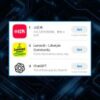
There’s no shortage of people who want to buy TikTok from China-based parent company ByteDance, the target of a new U.S. law that says it has to sell the social network within a year or see it effectively banned in the country. But so far, their expressions of interest have mostly seemed a little pointless.
Former Treasury Secretary Steven Mnuchin and former Activision CEO Bobby Kotick may be preparing their bids, but Beijing has repeatedly insisted that it doesn’t want ByteDance to sell the service. And if a sale does happen, it’s very likely that the buyer wouldn’t be getting TikTok’s core recommendation algorithm, the sale of which China can block under its export control rules. Shark Tank’s Kevin O’Leary highlighted this fact in March, when announcing his own imminent bid at a 90% discount to TikTok’s valuation at its last funding round—the buyer would have to “re-emulate” TikTok’s algorithm, he said.
But what if the buyer wants to use TikTok as a host for an idealistic rewrite of the social networking playbook, rather than trying to merely recreate its existing technology? That’s the tantalizing prospect being touted by former L.A. Dodgers owner Frank McCourt, who this morning announced his entry into the TikTok fray.
A few years ago, the Bostonian real-estate billionaire founded an organization called Project Liberty, dedicated to promoting an alternative to what he sees as the divisive, privacy-trampling, and exploitative ways of Big Tech. Much like web inventor Tim Berners-Lee, McCourt wants to bring back some of the flavor of the pre-Facebook web, where decentralization ruled and people could participate in online life without constant surveillance and manipulation. And Project Liberty isn’t just about advocacy—it’s also been developing a new protocol called the Decentralized Social Network Protocol (DSNP), which uses blockchain infrastructure.
So far, DSNP’s most notable adopter has been the privacy-first social network MeWe, which claims to have over 20 million users, and in which McCourt is an investor. But TikTok has over 170 million users in the U.S. alone.
“We see this potential acquisition as an incredible opportunity to catalyze an alternative to the current tech model that has colonized the internet,” McCourt said in a statement. “We believe we can preserve—and enhance—the TikTok experience by giving individuals and creators on the platform the value and control they deserve regarding who has access to their data and how it is used.”
Berners-Lee, who these days leads a decentralized-data project called Solid, is endorsing McCourt’s bid. “The web I invented was to provide power and value to individuals, which they do not have at the moment,” he said in the statement. “Users should have an ability to control their own data, to share it with other people and organizations as they choose. A TikTok utilizing open internet protocols, such as Solid, will embrace the critical values of privacy, data sovereignty, and user mental health.”
The social psychologist Jonathan Haidt, a prominent promoter of the idea that technology has caused an epidemic of mental illness among young people, is also on board, arguing that McCourt wants to evolve social media “in ways that are far less harmful to children and teens than it is today.” On the money side, the investment bank Guggenheim Securities is already involved, and McCourt is looking to build his bidding consortium.
Of course, the notion of decentralized social media is no longer as outlandish as it once was, with decentralized Bluesky and Mastodon picking up many of the former Twitter users who have fled X, and with even Meta’s Threads (another X rival) gradually adding support for the ActivityPub protocol that Mastodon uses to interoperate with other platforms. But if a network of TikTok’s size and cultural relevance were to be revamped to go against the Big Tech grain—explicitly rejecting the exploitative ways that Meta has come to embody—that would truly be something else.
More news below.
David Meyer
Want to send thoughts or suggestions to Data Sheet? Drop a line here.
NEWSWORTHY
RIP Meta’s Workplace. Meta will slowly close its Workplace enterprise communications to the outside world, so it can focus more on AI and the clearly-not-dead-yet metaverse. “Over the next two years, we will provide our Workplace customers the option to transition to Zoom’s Workvivo product, Meta’s only preferred migration partner,” a spokesperson told Reuters. The Slack/Teams competitor was launched in 2016 and will continue its existence as Meta’s internal messaging board.
YouTube’s Hong Kong censorship. YouTube will block users in Hong Kong from being able to see 32 videos that have displeased the authorities due to their inclusion of the protest anthem “Glory to Hong Kong.” The Alphabet unit and other observers of Chinese policy have criticized the court ban order behind the move, saying it calls into question Hong Kong’s free-market environment, Reuters reports.
Raspberry Pi listing. Raspberry Pi, the British maker of teensy computers that are popular with gadget developers and hobbyists, is planning an IPO in London. As the Guardian reports, this is great news for the London Stock Exchange, which has recently seen several companies switch their listings elsewhere, in particular New York—though the Chinese e-commerce behemoth Shein is reportedly considering a London flotation due to regulatory pushback in the U.S.
ON OUR FEED
“Unfortunately, we sort of messed up on the timing.”
—Google co-founder Sergey Brin thinks the company launched Google Glass a decade too early. Though he didn’t quite confirm the return of the much-mocked augmented reality headset, he said at yesterday’s Google I/O event that it was “the perfect hardware” for the firm’s new Project Astra AI chatbot tech.
IN CASE YOU MISSED IT
Amazon AWS CEO Adam Selipsky is out, by Jason Del Rey
Key player in on-again, off-again ouster of OpenAI CEO Sam Altman is leaving the company, by Bloomberg
OpenAI and Google lean in to AI personal assistants. Is this AI’s killer app?, by Jeremy Kahn
TikTok is footing the bill for a new lawsuit filed by creators challenging a ban, by the Associated Press
GM-owned Cruise reached a more than $8M settlement with pedestrian who was dragged by robo taxi, by Jessica Mathews
BEFORE YOU GO
Laser weapons. Wired has a must-read piece on laser weapons, which, after many decades of science fiction deployment, are now becoming a reality on the battlefield. Their real-world rollout has been stimulated by the sudden proliferation of cheap attack drones in conflicts in Ukraine, parts of the Middle East, and Azerbaijan—laser bursts work out a heck of a lot cheaper than missiles and, as long as they have power, they don’t run out like traditional munitions do. However, their use can be limited by atmospheric conditions and the U.S. military says it hasn’t quite worked out how to fight with lasers yet.






